Changing Lives for 20 Years — Part I

by Natasha Tworoski
PASA is celebrating 20 years of protecting Africa’s primates in 2020. In that time, the 23 members that make up the alliance have rescued thousands of endangered apes and monkeys from tragic circumstances like the bushmeat and illegal pet trade. Beyond rescuing and caring for gorillas, chimpanzees, bonobos, drills and many species of monkey, the centers do much more, like educating people on the importance of wildlife conservation and working with local authorities to protect fragile habitat. Today, PASA is a leading conservation charity that raises funds to save apes and monkeys, run programs across Africa to improve animal care, address systemic issues of wildlife trafficking and deforestation. PASA and its 23 members are proud of all that we have accomplished. Of course, the most important achievements are the individual primate lives that have been saved. As we mark PASA’s anniversary, we celebrate all the monkeys and apes who are getting a second chance at life thanks to all of our wonderful members and are profiling 20 in particular who represent the power of the PASA alliance.
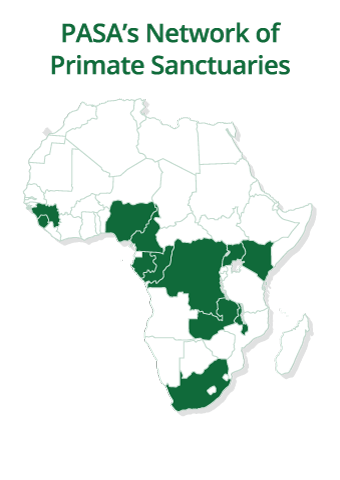
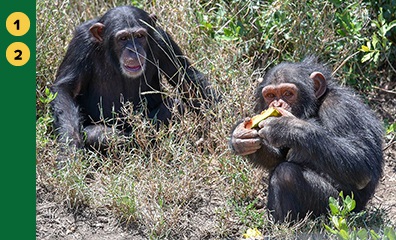
BO & BELLA
Sweetwaters Chimpanzee Sanctuary
Kenya
Chimpanzees are not native to Kenya, but 36 can be found living in the safe haven of Sweetwaters Chimpanzee Sanctuary in the Ol Pejeta Conservancy. With 250 acres of habitat to roam, the chimps at Sweetwaters have been rescued from a variety of cruel situations across the globe. Things can get complicated quickly when moving endangered species, like chimpanzees, across borders. There are multiple PASA member sanctuaries in western Africa that are equipped to rescue orphan chimpanzees, but when the rescue is in a country where no sanctuary exists, there are a lot of political hurdles to navigate. This was the case for Bo and Bella, two orphans being held in a park ranger station in Guinea Biassu. Both young chimpanzees had been rescued from the illegal pet trade, but were being kept in poor conditions while concerned people explored different options for where the pair could go. PASA worked closely with PEGAS, researcher Maria Joana Da Silva and Sweetwaters to move the chimpanzees where experienced caretakers could get them healthy. Today Bo and Bella are enjoying their new life with their new chimpanzee family. With their ample space, Sweetwaters remains an important PASA member for the most challenging chimpanzee placements.
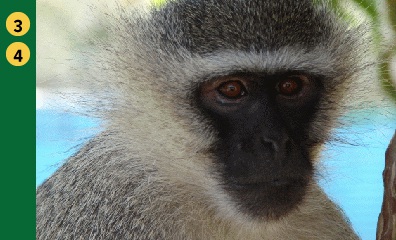
REMUS & BELL
Vervet Monkey Foundation
South Africa
The Vervet Monkey Foundation (VMF) in South Africa got their start because of a male vervet named Remus. Brand new to the world, he still had his umbilical cord attached when he was discovered after his mother had been shot by a farmer. When animal lover Dave Du Toit received Remus, officials instructed him to kill the monkey, since vervets were considered vermin. After a lengthy legal battle, Dave was able to create VMF and later had the South African classification for vervet monkeys changed from vermin to normal game, offering them more protection from such cruelty. Thirty-one years since Remus was first rescued, VMF has now saved over 600 monkeys! Even after helping so many monkeys, staff and volunteers at VMF are constantly facing new challenges. In 2018, a three month vervet named Bell was brought to the sanctuary. Bell likely got separated from her birth mother because she was blind, but now the sanctuary wanted to find a way to help her feel secure. She was introduced to Shasta as a surrogate mother, who had experience raising a blind infant, and now lives in a group of monkeys with other handicaps, such as Cuddy who suffered brain damage after being hit by a car. Giving careful consideration to each monkey’s situation is one of the reasons why VMF is such a great sanctuary!
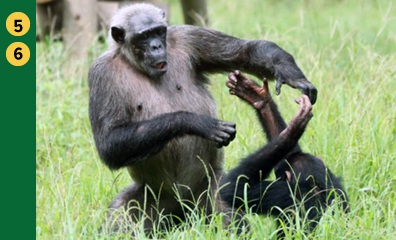
JOANNA & RIKITA
Tchimpounga Chimpanzee Rehabilitation Center
Republic of Congo
No one should experience the horror of watching their mother and family members killed, only to be stolen away to become an illegal pet. Unfortunately, this is the case for many of PASA’s rescues, who are intercepted as infants while being moved on the black market. Thankfully, when they are saved so young, they are able to get the medical and psychological support they need to recover. Chimpanzees Joanna and Rikita were not so fortunate. As babies, they were kept illegally as pets in Angola. When young chimpanzees approach adulthood, their strength greatly increases and they begin to show natural behaviors, like displaying and settling their frustrations with physical contact. Rikita and Joana became too much for their owner to handle and so he locked them in small concrete cages where they would stay for the next 12 years. After a concerned bystander notified PASA about their predicament, action immediately began to save them. Since there is no sanctuary in Angola for chimpanzees, the goal became to get Rikita and Joana to PASA member Tchimpounga Chimpanzee Rehabilitation Center in the nearby Republic of Congo. It took over two years to secure permits, have vets submit necessary bloodwork and exam results and to arrange the transportation, but everyone’s determination remained strong. Finally the big day arrived, as this video shows! Rescuers quickly discovered a third chimpanzee on site, two year old Tina. Today, all three chimpanzees are happily integrated in new communities at Tchimpounga, where they enjoy being outside living a much healthier life.
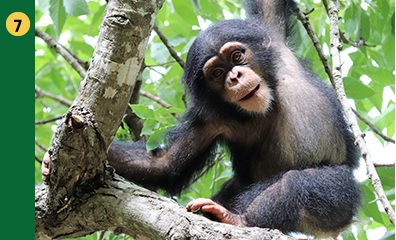
TITA
Chimpanzee Conservation Center
Guinea
Tita’s story is difficult to read. When a good samaritan notified the Eco Activists for Governance and Law Enforcement (EAGLE) Network about three baby chimpanzees living in cruel conditions, the team there took quick action. They found only one of the three chimpanzees was still alive so after enduring brutal torture including a broken arm, a severe eye infection and all of her fingernails being torn out. They learned later that after her mother was gunned down trying to save her, her sister spent hours attempting to protect Tita before she also was killed. After her rescue, Tita was rushed to the Chimpanzee Conservation Center (CCC) where they could see she was deeply traumatized. Miraculously, she pulled through that most critical time. In honor of her sister’s sacrifice, she was given the name “Tita” or “sister” in the regional language. It took over a year of affection and medical treatment before she was ready to be introduced to two other orphans, one of whom she immediately embraced. She lives happily with her new family today. When word spread of what Tita had endured, CCC received enough donations to hire two lawyers to take the poachers to court. They were convicted and received the maximum sentence of a $40,000 USD fine and one year in prison. PASA member sanctuaries are truly fighting for Africa’s primates on all fronts!
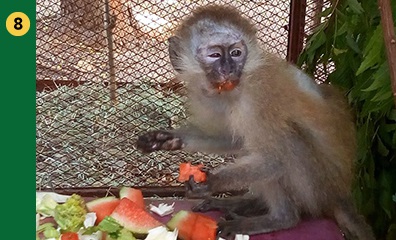
LIKONI
Colobus Conservation
Kenya
Likoni, a young male vervet monkey, also survived against great odds. He was rushed to PASA member Colobus Conservation after being found covered in engine oil and sustaining long, deep cuts on his head and body that were consistent with machete wounds. He could barely see, due to his eyes being swollen shut from injuries. After months of treatment, his tenacious spirit allowed him to start anew. Today he is integrated into a social group with other rescued monkeys.
Colobus Conservation is a leader in working with the community to improve the well-being of all monkeys in Kenya. This includes projects like implementing “Colobus bridges” across roads so that monkeys can avoid being hit by cars, working with electric companies to make power lines safer for crossing wildlife, and consulting with tourist locations that struggle with monkeys who become too comfortable around visitors. When it comes to wildlife conflicts between humans and monkeys, it always ends poorly for monkeys. However, Colobus Conservation has shown that with good leadership and initiative, people can come up with solutions that work for everyone.
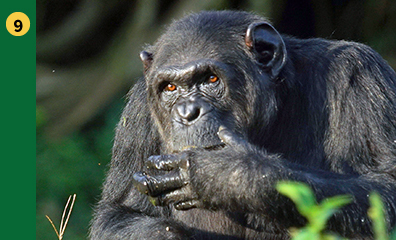
IKURU
Ngamba Island Chimpanzee Sanctuary
Uganda
Located on Uganda’s Lake Victoria is Ngamba Island Chimpanzee Sanctuary, home to 50 rescued chimpanzees, including Ikuru. During a war in the Democratic Republic of Congo in the 1990s, a Ugandan solider found Ikuru clinging to her mother’s body. Her mother had been a victim of the fighting. It took about four years bring Ikuru to Ngamba Island, and she was in poor condition. Her stomach was bloated from a worm infestation, her hair was falling out and her baby teeth mostly needed to be removed. For the next ten years, Ikuru would show signs of the trauma she had been through, such as rocking back and forth to comfort herself. Today, although low-ranking, she is well-adjusted and enjoys playing with the younger chimpanzees and spending lots of time grooming herself and others. After feeding time, she will move along the electric fence line with a stick, looking for the tossed fruit that fell just outside the fence. This clever girl will make sure to wait until there are no high-ranking chimps around before she uses her stick to get the fruit past the electric fence. She’s even ambidextrous! Ikuru’s story and personality are so likable, she was chosen to be featured in a comic book!
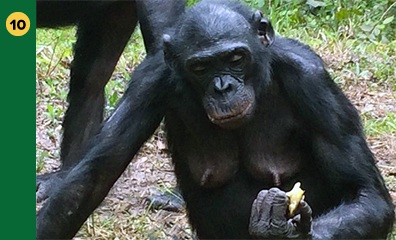
ÉTUMBÉ
Lola ya Bonobo
Democratic Republic of Congo
One African ape that often gets overlooked is the bonobo. Once thought to be a “pygmy chimpanzee,” bonobos are now recognized as an ape species all their own. They are only found in one region of one country, the Democratic Republic of Congo. Like other primates, infant bonobos are poached and sold into illegal wildlife trade. Known for their affectionate nature and very close social bonds, rescued orphaned bonobos historically had never survived rehabilitation attempts. Claudine Andre, founder of Lola ya Bonobo, showed that with love and care, it was possible to give rescued baby bonobos a second chance. Lola ya Bonobo is the only bonobo rehabilitation center in the world. Successfully starting the sanctuary during a brutal civil war, Claudine has never been one to back down from challenges and one of the biggest she faced was reintroducing bonobos to the wild. Through careful planning, Lola ya Bonobo selected a group of individuals who showed the independence, confidence and natural behaviors needed to succeed in the wild. The team found a release site and named it Ekolo ya Bonobo or “land of the bonobos.” In bonobo society, females are dominant and work together to “correct” individual males when needed. The first group of bonobos returned to the wild had quite the alpha female leader, Étumbé. She had been kept in a cramped cage for 15 years in a biomedical laboratory. You might think that she would have severe psychological damage making participation in a normal social group impossible, but Étumbé had proven herself to be a strong, capable leader, just the candidate to go back to the forest. She has since gone on to successfully give birth in the wild – the first reintroduced bonobo to do so – and is still living her best life in the 50,000 acres of forest at Ekolo ya Bonobo.
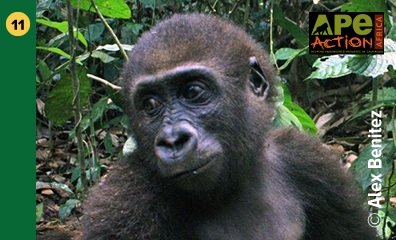
BOBGA
Ape Action Africa
Cameroon
Ape Action Africa has plenty of experience rehabilitating orphaned gorillas, but there still are cases that are extra challenging. After losing his mother and likely other family members to the illegal bushmeat trade, a young male gorilla named Bobga was brought to PASA member Limbe Wildlife Center in Cameroon. After a year, he had become a physically and mentally healthy young gorilla, and the two and a half year old was ready to live with a new gorilla family. One benefit of being in an alliance like PASA is that when Limbe didn’t have an appropriate group for Bobga, they reached out to others in the network. Ape Action Africa, a PASA member also in Cameroon, had a juvenile group which was deemed to be a good fit for Bobga. Being sensitive animals, it is important to go slow with gorilla introductions. Bobga’s primary caregiver Killi stayed with Bobga as he got used to his new sanctuary and the caregivers who would look after him. Once that transition was completed, it was time for Bobga to meet his new gorilla family. Getting to know each gorilla one at a time, Bobga was eventually ready to be integrated with his new family. After Bobga had started spending the nights as well as the days with his new group, his caregivers discovered him limping one morning. Separating him from the group for an examination, x-rays showed a fracture in his femur. It was suspected another member of his group pulled on his leg while he was sleeping on a platform during the night. To heal properly, it was important to limit Bobga’s movement. Fortunately, Bobga has been healing well. Throughout his recovery, he has always been able to see his groupmates and the plan is for him soon to join them again in the forest.
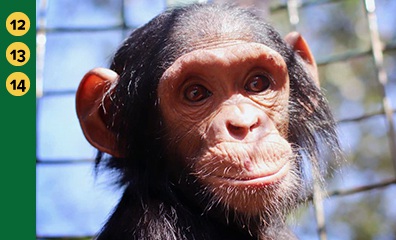
MUSSA, BOBO & MAISHA
Lwiro Primate Rehab. Centre
D.R. Congo
A plucky little chimpanzee named Mussa captured headlines globally in early 2018 with his unique rescue. Mussa was being kept illegally as a pet, along with a collection of protected reptiles, when he was rescued in northern Democratic Republic of Congo. Virunga National Parc anti-poaching pilot Anthony Caere flew Mussa south so he could get a new start at PASA member Lwiro Primate Rehabilitation Centre. Lwiro posted a video of Caere flying with Mussa in the cockpit, which showed the young chimp quietly looking at the passing scenery and nestling in Caere’s lap. After the clip went viral, Caere pointed out that while the video is endearing, the overall situation is very sad. To steal a baby chimpanzee, poachers would very likely have killed his mother as well as on average 10 chimpanzees in the community, who would have died defending the helpless baby. Mussa now is happily living with other young chimpanzees at Lwiro, who like him, overcame their own horrifying start in life.
Lwiro does not just specialize in chimpanzees. Being located in the Democratic Republic of Congo, the wildlife is incredibly diverse and many rescued animals are brought to Lwiro to get a new start. This included a young male black crested mangabey monkey named Bobo. After his mother was illegally poached to sell as meat, he was kept on display in a market as poachers sought a buyer for him. Gratefully, an American couple temporarily working in the country helped Bobo reach Lwiro before they left. Today he lives in a large space with many other monkeys for companionship.
A second memorable monkey rescue for Lwiro is an Owl monkey named Maisha. He also was almost a victim of the bushmeat trade, but instead the snare trap resulted in a severe injury where he lost his right foot. He was likely being kept a pet when he was confiscated in 2009. Through careful introductions, he was able to join a group of other monkeys. Today he is the feisty leader of his troop, despite his handicap!
 These are a few stories among the thousands of primates PASA members have rescued and rehabilitated over 20 years. While each individual has his or her own journey, the story is often the same. The illegal bushmeat and pet trades decimate wild primate populations. There are many primates who still need to be rescued unfortunately. PASA’s role in primate welfare has never been more critical Your support will help PASA and the wildlife centers who form our alliance continue this life saving work. Consider making a donation. Or sign and share our petition to stop the illegal pet trade. Your generosity and compassion fuel our mission. Please help us celebrate our 20th anniversary by making sure that PASA and all its members are around for another 20 years!
These are a few stories among the thousands of primates PASA members have rescued and rehabilitated over 20 years. While each individual has his or her own journey, the story is often the same. The illegal bushmeat and pet trades decimate wild primate populations. There are many primates who still need to be rescued unfortunately. PASA’s role in primate welfare has never been more critical Your support will help PASA and the wildlife centers who form our alliance continue this life saving work. Consider making a donation. Or sign and share our petition to stop the illegal pet trade. Your generosity and compassion fuel our mission. Please help us celebrate our 20th anniversary by making sure that PASA and all its members are around for another 20 years!
